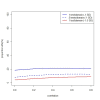The definition of HIV-associated neurocognitive disorders: are we overestimating the real prevalence?
- PMID: 22204557
- PMCID: PMC3260107
- DOI: 10.1186/1471-2334-11-356
The definition of HIV-associated neurocognitive disorders: are we overestimating the real prevalence?
Abstract
Background: A substantial prevalence of mild neurocognitive disorders has been reported in HIV, also in patients treated with combination antiretroviral therapy (cART). This includes a new disorder that has been termed asymptomatic neurocognitive impairment (ANI).
Discussion: ANI is identified by performance on formal neuropsychological testing that is at least 1 SD below the mean of normative scores in at least two cognitive domains out of at least five examined in patients without associated symptoms or evident functional impairment in daily living. While two tests are recommended to assess each domain, only one is required to fulfill this diagnostic criterion. Unfortunately, this definition necessitates that about 20% of the cognitively normal HIV-infected population is classified as suffering ANI. This liberal definition raises important ethical concerns and has as well diagnostic and therapeutic implications. Since neither its biological substrate, prognostic significance nor therapeutic implications are clearly established, we recommend that this diagnosis be modified or applied cautiously.
Summary: The diagnoses of less severe forms of neurocognitive disorders in HIV relies on the outcomes of neuropsychological testing, and a high proportion of HIV-infected patients with effective cART may be classified as neurocognitively abnormal using the current criteria. The definition of ANI is not stringent, and results in approximately 20% of the population being classified as abnormal. To us this seems an unacceptable false-positive rate.
Figures

References
-
- Bhaskaran K, Mussini C, Antinori A, Walker AS, Dorrucci M, Sabin C, Phillips A, Porter K. Changes in the incidence and predictors of human immunodeficiency virus-associated dementia in the era of highly active antiretroviral therapy. Ann Neurol. 2008;63(2):213–221. doi: 10.1002/ana.21225. - DOI - PubMed
-
- Lescure FX, Omland LH, Engsig FN, Roed C, Gerstoft J, Pialoux G, Kronborg G, Larsen CS, Obel N. Incidence and impact on mortality of severe neurocognitive disorders in persons with and without HIV infection: a Danish nationwide cohort study. Clin Infect Dis. 2011;52(2):235–243. doi: 10.1093/cid/ciq041. - DOI - PubMed
-
- Heaton RK, Clifford DB, Franklin DR Jr, Woods SP, Ake C, Vaida F, Ellis RJ, Letendre SL, Marcotte TD, Atkinson JH. et al. HIV-associated neurocognitive disorders persist in the era of potent antiretroviral therapy: CHARTER Study. Neurology. 2010;75(23):2087–2096. doi: 10.1212/WNL.0b013e318200d727. - DOI - PMC - PubMed

